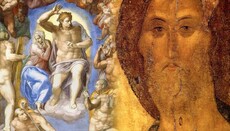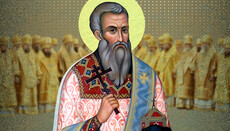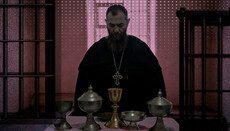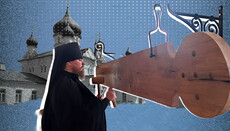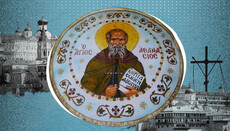“Picasso”: How to Read the Bible

Excerpts from Andrey Vlasov’s book “Picasso. Part One: The Slave.” Episode 17.
Time: 1992
Place: Kyiv
Characters: Fr. Lavr, seminarians.
Two days later, the library was packed to overflowing. Not only had the entire first-year class come, but many students from other classes as well, and even several academy students. Many came to hear again what Fr. Lavr had once taught them before. His personality was very magnetic, though that wasn’t obvious at first. There was nothing remarkable about him. You couldn’t call him a grace-filled elder, or a wise teacher, or a brilliant preacher. He seemed utterly ordinary. Yet the longer one spoke with him, the more one felt drawn by some quiet power of spirit, faith, and love emanating from him. If someone asked, “What exactly was that power expressed in?” there would be no answer. It was expressed in nothing – and in everything at once. But that it was there was obvious to anyone who had known him even a short while.
He entered the classroom slowly, bowed, and greeted everyone. The students sang “O Heavenly King…”
“Be seated, brothers.”
They sat down.
Fr. Lavr took from his bag a Bible in a worn leather binding, reverently kissed it, and began to speak:
“Raise your hands, brothers, those of you who have read the entire Bible from cover to cover.”
About half raised their hands.
“The sickness that devours a person is neglect of the Word of God. People do not read the Bible – and do not want to read it. And even those of you who proudly raised your hands have most likely read the Scripture once and stopped there. Yet God calls us to meditate on the Law of the Lord day and night. That means the reading of the Word of God – especially the Gospel and the New Testament – is the work of an entire lifetime.”
He paused briefly.
“Every person who wishes to open the Holy Scriptures and draw from them something for the benefit of his soul must first of all pray to God that He open his mind and heart to understand His words. ‘Except the Lord build the house, they labour in vain that build it.’ Understanding comes from God. But it is also useful to remember certain things – rules for reading the Word of God.”
He slowly looked over the students.
“Brothers, to help you understand how difficult it was for the earthly authors of the Holy Scriptures to express the truths God revealed to them – and how difficult it can be for us to understand these truths – let us conduct a little experiment. You will now hear something, and I’ll ask you to write it down.”
Half the students pulled out their notebooks and pens. Fr. Lavr went to the back of the room and sat down at the piano. After a brief pause, he began to play a classical piece. When he finished, he returned to the desk and said:
“Well then, brothers, write down in words what you just heard.”
He paused again, watching their puzzled faces.
“That,” he said finally, “is roughly what the holy authors of Scripture experienced when they had to express in human language the heavenly truths revealed to them by God. The human tongue is weak; it cannot fully convey the depth of divine revelation. But this revelation can be known – to the measure possible for the human mind. And we can know it from the Bible, the Word of God. To do this, we must know several rules, approaches – again, principles – for reading the Holy Scriptures.”
Some students carefully wrote in their notebooks: “Principles of Reading the Bible.”
“First,” continued Fr. Lavr, “we must understand that the Word of God has two authors – God and man. ‘All Scripture is God-breathed.’ This means that the Holy Spirit revealed to man the words of life that we now read. On the other hand, the men who wrote the books of the Bible were not passive mediums taking dictation…”
(“Like we are in catechism,” Misha thought.)
“…they reflected upon the truths revealed to them and expressed them in words, exercising their own human creativity – which itself is a gift of God. This does not mean that Moses, Isaiah, or the Apostle Paul could have distorted or misrepresented divine truth. Again, what is written in the Bible is exactly what the Holy Spirit revealed to them. But the writers also reflected the character of their era, their nationality, temperament, and many other traits. Let us not forget, brothers, that the books of the Bible were written over about fifteen centuries, in different languages, by people living in different lands – Babylon, Rome, Greece, Jerusalem. The authors included a shepherd, Amos; a king, David; uneducated fishermen, Peter and John; and a rabbinically trained scholar, Paul. All this left its imprint on the sacred text.”
He paused.
“So, brothers, two authors: God and man – or rather, men. Now tell me, who understands Russian literature better, a Russian or an Englishman?”
“A Russian!”
“And German literature?”
“A German!”
“And who understands Pushkin better – we, or those who lived in his time?”
“They do! I mean, those who lived then.”
“Exactly, brothers. The author is best understood by those who are closer to him – in spirit, in time, in nationality. From this comes the conclusion, brothers: the closer one is to the authors of Scripture, the better one understands it. Again – both to God and to the human writers. One draws near to God through a righteous life, ascetic struggle, and prayer. Remember, brothers, that only ‘the pure in heart shall see God.’ Those who think they can understand Scripture while living sinfully are gravely mistaken. This is why the holy fathers – Anthony the Great, Macarius, John Chrysostom, and others,” (here Fr. Lavr crossed himself) “– whether educated or even illiterate, understood the meaning of the Bible far more deeply than, say, the German scholars Semler, Michaelis, Lessing, and others. Without striving to approach God in asceticism and prayer, if we read Scripture as though it were merely an interesting book, we will be like that crowd which thronged around Christ yet gained nothing – while only the woman who touched Him in faith was healed.”
He continued:
“One must also draw nearer to the time, customs, and manners of the age in which each book of the Bible was written. For example, the parable of the Publican and the Pharisee cannot be understood without knowing who a publican was, who a Pharisee was, and what the political situation of Judea was at that time – its relationship to the Roman Empire, and so on. Likewise, we cannot fully grasp the parable of the Good Samaritan without knowing what the road from Jerusalem to Jericho was like. Again, we must know much from history and ethnography to understand Scripture correctly.”
“In addition, one must pay attention to the context of particular words in Scripture – where they were spoken, by whom, and for what reason. For example, the Apostle James says in his Epistle that ‘faith without works is dead,’ while the Apostle Paul says that ‘a man is justified by faith apart from the works of the law.’ We would think this a contradiction if we did not understand that they speak of different works. James speaks of works of love, the greatest commandment; Paul, of the ceremonial works of the Mosaic law, which indeed do not justify us. To understand this, we must at least take the trouble to read not a single verse, but the entire chapter – or better, the whole epistle. Again, pay attention to context.”
“What is a ceremonial law?” someone asked.
“Ceremonial law?” Fr. Lavr stroked his beard. “These are external prescriptions – from circumcision to…” he closed his eyes and recited, “‘Speak to the sons of Israel and tell them to make tassels on the corners of their garments throughout their generations, and to put a blue cord on the tassel at each corner.’”
“What is circumcision?” someone in the back row snickered.
That was impertinence, and Fr. Lavr let it pass in silence.
“Secondly, we must understand that Scripture is not addressed to everyone. It is addressed to the people of God. Before Christ’s coming, that meant Israel; after – Christians of every tribe and nation. And this belonging to the people of God is essential for correctly understanding the Bible. For others, it remains external knowledge – incomprehensible and unexplained. Just as we cannot truly understand the sacred books of other faiths – the Qur’an, the Hindu Vedas, and so on – it is like reading someone else’s mail. We will not grasp the meaning intended for the addressee. Therefore, the guarantee of right understanding of the Word of God is belonging to the Church of Christ – not only formally, through baptism, but in spirit.”
He paused again.
“Again, in the history of Christianity there are books called ‘Apologies.’ These are writings addressed to outsiders – attempts by Christian theologians to explain our faith to pagans. But the Bible, I repeat, is a book addressed inwardly. And it is the Church of Christ – indeed, I would even say only the Church of Christ – that has from God the gift to understand the Holy Scriptures rightly. If the Church, through her holy interpreters, understands a passage in a certain way, then that is the correct understanding, whatever outsiders may say. History shows that the Church has preserved Scripture with great care – continually instructing her faithful children how to understand it rightly and warning against false interpretation. For the distortion of faith leads to spiritual ruin, and it is very easy to fall into false thinking – it is enough to be attracted by the eloquent and seemingly beautiful explanations of non-Orthodox writers. Therefore, neither you nor your future parishioners should read Protestant, Catholic, or secular works on biblical subjects. May God grant us to learn from the holy fathers instead.”
“But you’ve read them yourself,” someone objected.
Fr. Lavr stroked his beard.
“Well… if you intend to dedicate your whole life to biblical scholarship, then perhaps… but I think there are few such among you. Now, what I want to say further about Scripture and the Church is this: Scripture is the child of the Church – it was born from her womb. It cannot be torn away from her. It was the Church that defined the canon of the Holy Scriptures, choosing from the many books then circulating those that were truly divine revelation. The Church recognized them by the Holy Spirit and included them in the Bible, confirming this at the Councils. We know, after all, of other gospels written by different people, other epistles falsely attributed to the apostles, even Old Testament books falsely ascribed to prophets. These are the so-called apocrypha – rejected by the Church. Therefore, gravely mistaken are those – mostly Protestants, ahem – who recognize the authority of Scripture but not the authority of the Church of Christ. Now then, secondly…”
“Thirdly,” someone corrected him.
To be continued…
The previous episode of the book is available here.
